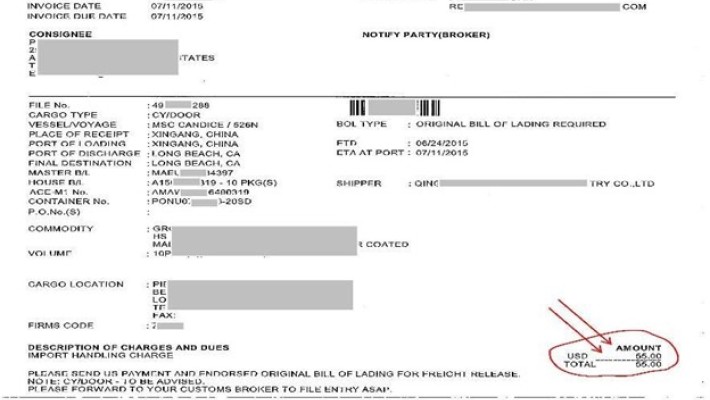Freight Forwarder Insights
Huin International Logistics Latest Articles
Cargo Arrival Notice
What is mean by Arrival Notice?
The term ‘Cargo Arrival Notice’ can be known in same words mentioned. Although the term Cargo Arrival Notice is too simple to understand on its grammatical meaning, the importance of Cargo arrival notice is very important to any exporter or importer is concerned.
Once after arrival of goods at final destination, the carrier of goods intimates consignee on such arrival with details. If shipment is via sea, the details of CAN include of vessel, voyage, date of arrival, number and kind of packages, number of free days allowed to complete import customs clearance procedures, reference numbers like BL number, container number etc.
Once after arrival of cargo at final destination, the carrier of goods intimates the said arrival to consignee of goods to take delivery of cargo. If any amount is due to be paid by consignee the same also is mentioned in the same document as ‘Cargo arrival notice cum Invoice’.
Although carrier sends cargo arrival notice (CAN) to importers, it is the duty of consignee
/buyer/importer to track arrival of goods.
Arrival notice provides details of the arriving cargo corresponding with the sea freight bill of lading related to the international shipping. It should also provide charges related to the recovery of importing from the overseas goods. It should also provide the initial instructions related to the recovery and a list of necessary documents. It should contain:
• Commodity description
• Sailing details
• Destination country customs related charges
• Ocean freight carrier's agent's contact details
• LOT number associated with the arriving cargo
• Initial instructions on the import recovery, etc.
Please keep in mind that an Arrival Notice is NOT a freight release document. Arrival Notice is a document that allows the consignee to file the entry of importing goods into the commerce zone of the destination country and initiate the import recovery under the law of the country.
Parties involved in import process
• The consignee (in respect of import recovery called Importer of Records)
• Destination’s country officials (Destination country's Customs, Government agencies that may concern imported goods, Customs and border protection officers, etc.)
• An international ocean freight carrier's destination agent.
• A Customs broker licensed in the destination country. Most of the time, the ocean freight carrier's' agent is the Customs broker as well.
• Other parties related to the import recovery and delivery (if necessary) "to the door" of the recipient of the importing goods: domestic freight forwarders, bonded and local warehouses, local cargo transportation companies, etc.
Please note that import recoveries in international shipping are a complex and time-sensitive process. Even though most of the countries over the world allow to consignees (importers of records) to work on cargo recoveries directly with the Customs, unless you are not a professional, it is a good idea to work on the recovery with the international carrier's agent or hire a licensed in the country customs broker.
Moreover, if shipping from the overseas freight LCL, unlike with FCL, you always have an ocean carrier's agent responsible for the de-consolidation of your cargo. For a reasonable fee, you should avoid the headache and/or extra charges that may occur in the event if you fail in your destination country's import recovery procedures.
Do not ignore or delay with your cargo recovery at the destination
IMPORTANT!!: Since you made your decision to ship goods from the origin country to overseas, you must clearly understand that as soon as your goods exit the origin country Commerce zone, origin country laws do not apply on your freight. Neither origin country freight forwarder nor ocean freight carrier will be able to assist you in your import recovery overseas. Ocean freight carrier's destination agent should guide. However, the agent is not a origin country business. No one but your consignee (in respect of import recovery professionally called Importer of Records) can be aware of and work on issues that may lead to problems with your importing goods at the destination.
Yes, International Maritime Laws should apply to your freight. But depending on the country that you ship to, the Laws may be interpreted in different ways. Do not say about other subjective factors peculiar only to your destination country.
Most of the time, with LCL freight, you do not need to hire a destination country's customs broker. Carrier's destination agent is the customs broker, as well. However, we suggest that in case of problems, your first step should be to apply for help from an independent customs broker licensed in the destination country.
What we can suggest to you if for some reasons you will experience problems with the recovery of your LCL sea freight shipment at the destination?
If, for any reason, you will not be contacted by sea freight carrier's destination agent on/in a few days prior ETA (Estimated day of Arrival), do not wait and contact them first. The contact info is in your bill of lading.
Always request a legal Arrival Notice. Your Arrival Notice must be dated and contain the agent's letterhead and destination charges breakdown. Phone calls or random emails are not enough.
Properly work with sea freight carrier's destination agent. Respect the agent's job. Their business is to get your goods for you as soon as possible. Follow the agent's instructions. Pay destination charges and fees (sometimes called Local Charges) and possess your released goods.
If you face a problem with your shipping from the origin county, do not hesitate to contact us. However, if you will not provide a copy of your legal Arrival Notice, most likely, we are unable working with the carrier on your behalf. I.e., we will always need a copy of your Arrival Notice.
Remember: Import recoveries are time-sensitive! As quickly you begin working on it as less probably that you will get the deadline penalties: storage, demurrage, Customs penalties, etc.
